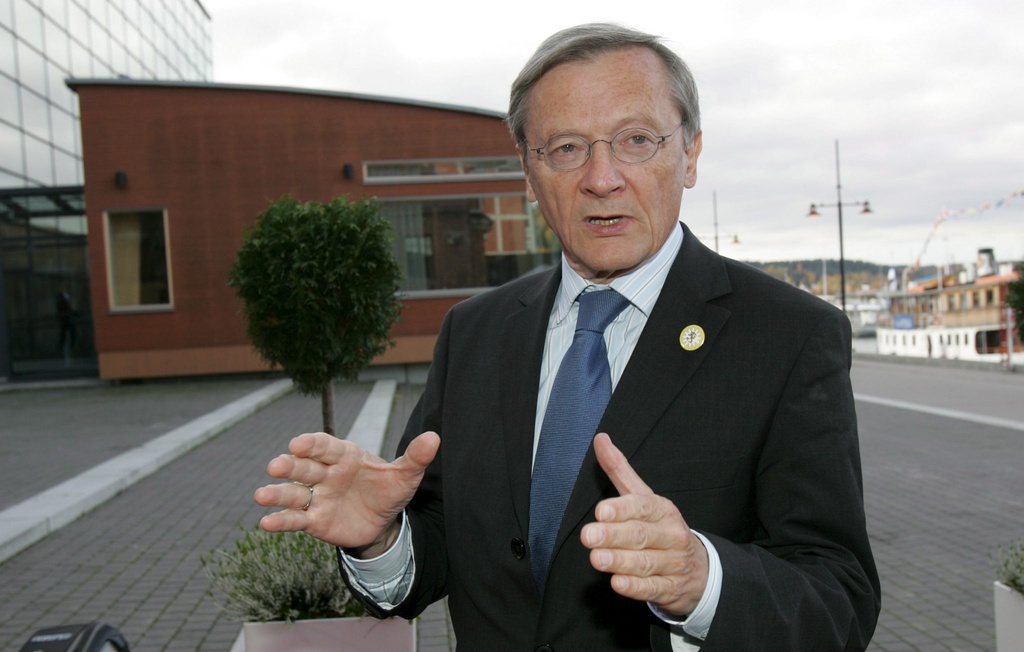
Letting Greece into euro zone was “a mistake”

With the benefit of hindsight, the decision to admit Greece into the euro zone was an error, Austria’s chancellor at the time tells swissinfo.ch.
Wolfgang Schüssel also says Austria’s decision to join the European Union in 1995 “made perfect sense”, although he hedges his bets when asked whether Switzerland should do the same.
Schüssel, who headed the Austrian government from 2000 to 2007, played down similarities between his country and Switzerland. At the same time he stressed that Brussels and Bern “needed” and “appreciated” each other.
He was speaking at an international human rights conference in Bonn, “Human rights in a globalized world – challenges for the media”, which took place at the end of June.
swissinfo.ch: You were chancellor of Austria when Greece – currently on the verge of bankruptcy – joined the eurozone in 2002. Did everyone in charge just turn a blind eye? Was it a political decision?
Wolfgang Schüssel: It’s a good question. The euro is obviously a political project, but it obviously also has very precise economic conditions. I was there [when the criteria were set] as foreign minister in 1997. We came up with criteria that had to be applied: the annual government budget deficit mustn’t be greater than three per cent of gross domestic product (GDP), gross government debt mustn’t exceed 60 per cent of GDP, and the exchange rate must be stable.
In 1998, the only countries that were accepted [into the eurozone] were those that could fulfil these criteria. Greece wasn’t one of them – it’s acceptance was delayed by three years. In their assessment, the European Commission and the European Central Bank said they were both satisfied. That was a mistake – looking back today, that has to be said quite categorically.
That said, the Greeks also used tricks. For example, military expenditure rose between 2000 and 2010 from €3 billion (SFr3.66 billion) to €10 billion. This was calculated not in the year of purchase but in the year of delivery – that twists the picture.
swissinfo.ch: To an extent Austria can be compared with Switzerland. What has EU membership brought Austria?
W.S.: I don’t think Austria can be compared with Switzerland. Switzerland has the advantage that it didn’t have to go through two world wars and was more international right from the beginning.
Switzerland has large global players, which operate abroad from Switzerland. Austria doesn’t. Switzerland has very low debt – we don’t, because we’ve had loads of catching up to do. Those are big differences.
For Austria, joining the EU made perfect sense. We slid from the edge of Europe right into the middle. For us it was a unique opportunity, also to rethink our own rules. The Union helped us overcome many corporatist ways of thinking and isolation.
But I don’t believe that in Switzerland Europe is seen as the Titanic, being steered towards an iceberg. Switzerland is the EU’s second-biggest trading partner – bigger incidentally than many other large countries.
Vice versa, the EU is Switzerland’s largest trading partner. We need each other, we appreciate each other. And whichever way Switzerland eventually goes is its own business.
swissinfo.ch: What are the consequences of Switzerland’s non-membership?
W.S.: The Swiss have no voice – the bilateral treaties call for a practically autonomous position. That is a part of the loss of sovereignty that Switzerland must accept. Austria on the other hand has a determining influence. Obviously only up to a point, but nevertheless.
A current disadvantage caused by Switzerland’s lack of EU membership is the massive appreciation of the franc. The economic effects might not be felt by the Swiss in the street, but they will threaten jobs, industry and the export situation for a while. There’s no free lunch, is there? Everything in life has its price.
swissinfo.ch: Are the bilateral treaties a viable way for Switzerland in the medium or long term?
W.S.: Switzerland doesn’t need my advice. I get the impression that the vast majority of voters and politicians are very comfortable with the bilateral treaties.
You shouldn’t forget that if the treaties are terminated, everything will have to be renegotiated – and that wouldn’t be much fun.
As a long-time observer of Switzerland, I trust the wisdom of Swiss voters. They know exactly what is good for them. And the EU remains Switzerland’s most important trading partner, no question.
swissinfo.ch: Agriculture is a sensitive issue in Switzerland. Farmers perceive the EU as a danger. What has EU membership brought Austrian farmers?
W.S.: EU membership was initially very controversial among Austrian farmers. During the accession negotiations we actually wanted a ten-year transitional period.
Previously we were an import nation when it came to agricultural products. Now we export up to two billion euros’ worth of such products.
Previously it was simply impossible to break into the Italian or German market. Now it goes without saying that we sell quality Austrian products. We set ourselves the goal of becoming the delicatessen of central Europe and this has been a real success.
Also the funding for mountain farmers has turned out very well. For ten years the EU Commissioner for Agriculture, Rural Development and Fisheries was Austria’s Franz Fischler. Fischler developed the concept of regional development and environmental agriculture. Austria benefits massively from this.
Wolfgang Schüssel was born in Vienna in June 1945. He studied at Vienna University, receiving a doctorate in law in 1968.
Having been economics minister since 1989, Schüssel became leader of the centre-right Austrian People’s Party in April 1995.
The following month he was sworn in as vice-chancellor and foreign minister. He was Chancellor of Austria from February 2000 to January 2007.
His controversial chancellorship was marked by the creation of a coalition government in 2000 with the rightwing Freedom Party, led by Jörg Haider.
This caused widespread outrage in Europe, and the EU imposed informal diplomatic sanctions on Austria, the first time that it had imposed sanctions on a member state. Bilateral relations were frozen, including contacts and meetings at an inter-governmental level, and Austrian candidates would not be supported for posts in EU international offices.
Since 2006 Schüssel has been chairman of the Austrian People’s Party faction in parliament.
(Adapted from German by Thomas Stephens)

In compliance with the JTI standards
More: SWI swissinfo.ch certified by the Journalism Trust Initiative















![The four-metre-long painting "Sonntag der Bergbauern" [Sunday of the Mountain Farmers, 1923-24/26] had to be removed by a crane from the German Chancellery in Berlin for the exhibition in Bern.](https://www.swissinfo.ch/content/wp-content/uploads/sites/13/2025/12/01_Pressebild_KirchnerxKirchner.jpg?ver=a45b19f3)














You can find an overview of ongoing debates with our journalists here . Please join us!
If you want to start a conversation about a topic raised in this article or want to report factual errors, email us at english@swissinfo.ch.